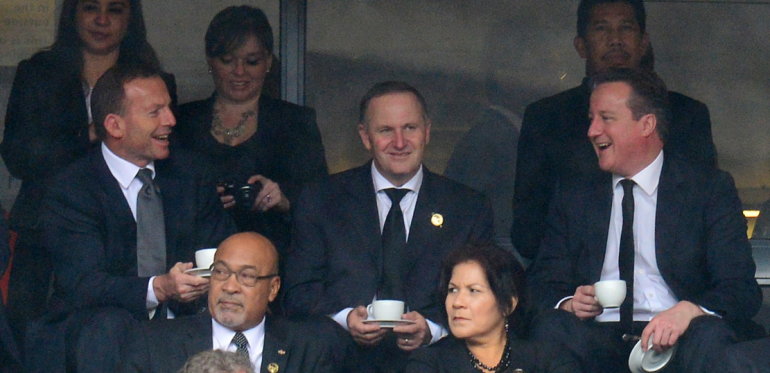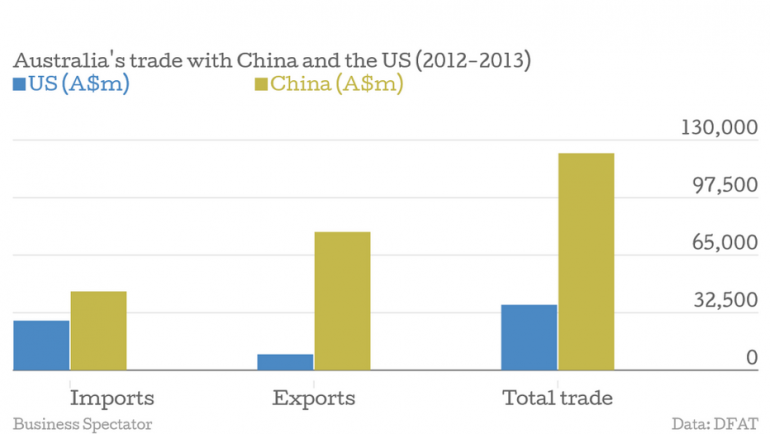Chinese lessons from Abbott's conservative cousins

Prime Minister Tony Abbott laughs with his conservative counterparts from New Zealand and Britain, John Key and David Cameron at the official memorial ceremony for late South African President Nelson Mandela.
Tony Abbott, David Cameron and John Key have a lot in common. They all wear blue ties, worship Sir Winston Churchill and love her Majesty the Queen. Cameron and Abbott even went to the same university – Oxford.
Abbott and Key are both unapologetically Anglophile. The former made clear in his auto-biography Battlelines about his vision for a revived Anglo-sphere centric diplomacy. Key restored the titles of knights and dames in 2009 after he became New Zealand prime minister.
However, despite their close ideological and cultural ties, their approaches to China could not be more different. Cameron and Key have enthusiastically embraced the idea of engaging more intimately with China, signing free trade agreements, rolling out the red carpet for Chinese investors and adopting a more independent China policy from Washington.
Abbott’s government, on the other hand, has signalled its retreat from engaging with Australia’s most important trading partner. Foreign minister Julie Bishop said in Washington that the United States was Australia’s most important economic partner, ditching the usual formula that describes China as number one, according to her interview with the AFR.
She went on to explain the bilateral trade and investment relationship between the US and Australia was about one trillion, easily dwarfing the two-way merchandise trade of $130 billion between China and Australia.
The choice of the one trillion dollar figure is a baffling one. It seems she arrived at that figure by including nearly $500 billion worth of total stock of American investment in the country since WWII. That is comparing apples with oranges.

The Abbott government’s decision to downplay bilateral economic ties with China at a time when the relationship has suffered serious setbacks is strange. The need to please the Americans is understandable but its message to Beijing is also unmistakable – you are not indispensable to us.
It is a bad signal at a critical time when Australia tries to conclude a free trade agreement with Beijing within a year. It is interesting to compare how Abbott’s conservative colleagues have handled their relationships with China.
When China established an air defence zone – a controversial act at time of escalating tensions in the region near the disputed Diaoyu/Senkaku islands, Canberra posted arguably the strongest protest aside from Japan and the United States. The Chinese ambassador was called in for a dress down – a diplomatic rebuke that was 7 on the Richter scale.
The Chinese foreign minister returned the favour when Bishop was in Beijing. The diplomatic relationship has chilled considerably since.
New Zealand defence minister Jonathan Coleman, who was in Beijing at the time, took a deliberately neutral and backseat approach. He said he “would be telling his hosts that New Zealand did not take sides in disputes and wanted them resolved through international processes,” according to New Zealand Herald.
Kiwi ministers also hinted recently to their Australian colleagues at the Leadership Forum in Sydney that a good political relationship with Beijing would help to seal a coveted free trade agreement with the world’s largest consumer market. Britain’s foreign office also chose not to get involved in a nasty dispute between China and Japan that is deeply rooted in history.
Abbott’s conservative peers have also taken a decidedly different approach to Chinese investment and especially in dealing with Chinese technology giant Huawei.
Before last year’s election, senior members of the Coalition including Malcolm Turnbull and Andrew Robb raised the prospect of reviewing and potentially overturning the Gillard government’s decision of banning Huawei from participating in the national broadband network.
New foreign minister Julie Bishop also supported their moves and all three senior cabinet ministers drew a connection between the Huawei decision and Abbott’s ambitious goal of completing a free trade agreement with Beijing this year.
Then, Prime Minister Abbott and Attorney General George Brandis, swiftly and without warning killed off the debate and announced their decision to uphold previous government’s ruling. Leaving aside the merits of the decision itself, the new government’s diplomacy was about as delicate as a sledgehammer.
Claude Barfield, a former US trade official from the right-wing American Enterprise Institute described Abbott’s government’s decision as “a stunning example of diplomatic ineptitude”.
What is perhaps most interesting is that Britain and New Zealand both allowed Huawei to build their national broadband projects. Though Australia, Britain and New Zealand are all members of the so-called “Five Eyes” Western intelligence alliance, Britain and New Zealand have arrived at very different conclusion based on arguably the same intelligence.
Huawei is operating a joint-testing centre with GCHQ, Britain’s communication spy agency to vet its own equipment. Huawei Australia’s chairman John Lord – a former admiral – also put forward a similar proposal but was ignored.
The Abbott government’s confrontational approach towards our Asian neighbours including Indonesia, Timor and China is deeply concerning. It is certainly at the odds with the key objective of new government’s foreign policy – advancing Australia’s commercial interests.
“Our focus will be on economic diplomacy,” Bishop said, “Our diplomats will be required to understand our commercial interests – and as the head ambassador, if you like, I would make trade a centre piece of my work.”
Follow Peter Cai on Twitter: @peteryuancai
Subscribe to the China Spectator newsletter: http://bit.ly/ChinaSpec













